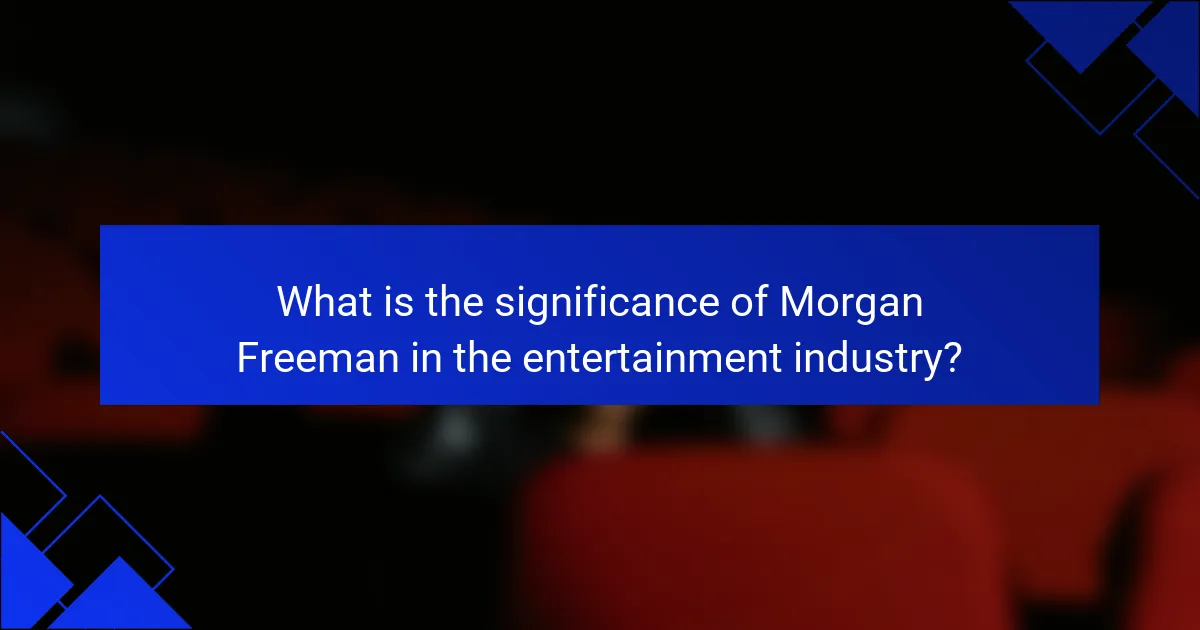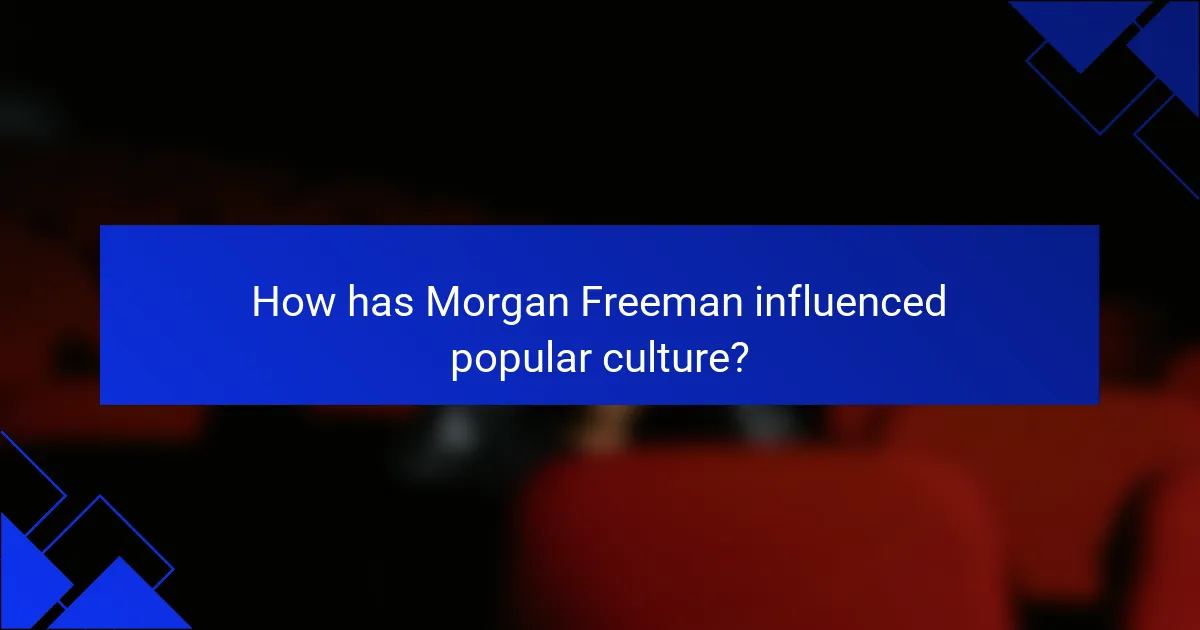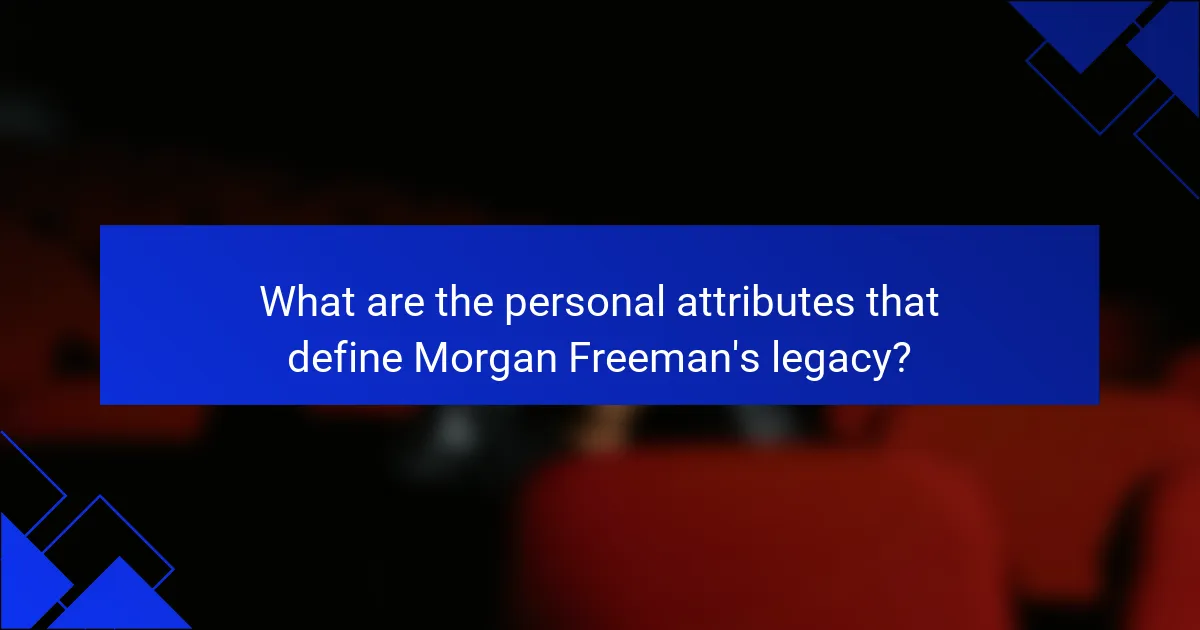
What is the significance of Morgan Freeman in the entertainment industry?
Morgan Freeman is a highly significant figure in the entertainment industry. He is renowned for his distinctive voice and exceptional acting skills. Freeman has won numerous awards, including an Academy Award for Best Supporting Actor for “Million Dollar Baby.” He has also been nominated for several other Oscars throughout his career. His roles in films such as “The Shawshank Redemption” and “Driving Miss Daisy” have left a lasting impact on cinema. Beyond acting, Freeman is celebrated for his work as a narrator. His narration in documentaries, including “March of the Penguins,” has garnered critical acclaim. Freeman’s contributions extend to philanthropy, supporting various educational and social causes. His influence and legacy continue to inspire aspiring actors and filmmakers.
How did Morgan Freeman’s narration style become iconic?
Morgan Freeman’s narration style became iconic due to its distinctive qualities. His deep, resonant voice conveys authority and warmth. Freeman’s pacing is deliberate, allowing listeners to absorb the content. He often employs a conversational tone, making complex subjects accessible. His ability to evoke emotion enhances storytelling, creating a connection with the audience. Freeman’s extensive experience in film and television has honed his skills. He has narrated numerous acclaimed documentaries, further solidifying his reputation. The combination of these elements has made his narration instantly recognizable and widely revered.
What are the key characteristics of Morgan Freeman’s narration?
Morgan Freeman’s narration is characterized by a distinctive, deep voice that conveys authority and warmth. His pacing is deliberate, allowing listeners to absorb the content. Freeman often employs a calm and soothing tone, which enhances the emotional impact of the narration. He uses clear enunciation, making his speech easy to understand. His ability to convey complex ideas in a relatable manner sets him apart. Freeman’s narration frequently includes a storytelling quality, engaging the audience effectively. His extensive experience in film and documentary narration adds credibility to his voice work. These elements combine to create a memorable and impactful listening experience.
How does his voice contribute to storytelling?
Morgan Freeman’s voice enhances storytelling through its distinctive qualities. His deep, resonant tone conveys authority and wisdom. This creates a sense of trust and engagement with the audience. Freeman’s vocal delivery includes a measured pace that allows listeners to absorb the narrative. His expressive intonations emphasize emotional moments, drawing listeners into the story’s depth. Research shows that voice quality significantly influences audience perception and emotional response. For instance, a study published in the Journal of Voice highlights how vocal characteristics can shape the listener’s connection to the narrative. Freeman’s voice exemplifies this principle, making his storytelling impactful and memorable.
What are the major milestones in Morgan Freeman’s career?
Morgan Freeman’s career milestones include his breakout role in “The Electric Company” in the 1970s. This television show showcased his acting talent and introduced him to a wider audience. He gained further recognition for his performance in “Street Smart” in 1987, earning an Academy Award nomination. In 1994, Freeman starred in “The Shawshank Redemption,” a film that has since become iconic. His role in “Driving Miss Daisy” in 1989 also contributed significantly to his acclaim, winning him an Academy Award for Best Picture. In 2005, he received the AFI Life Achievement Award, recognizing his contributions to film. Freeman’s voice work in documentaries and commercials has established him as a leading narrator. In 2012, he was awarded the Screen Actors Guild Life Achievement Award. These milestones reflect his diverse talents and lasting impact on the film industry.
Which films and roles are considered his career highlights?
Morgan Freeman’s career highlights include significant roles in films such as “The Shawshank Redemption,” “Driving Miss Daisy,” and “Million Dollar Baby.” In “The Shawshank Redemption,” he portrayed Ellis “Red” Redding, earning an Academy Award nomination. His role in “Driving Miss Daisy” as Hoke Colburn won him an Academy Award for Best Supporting Actor. In “Million Dollar Baby,” Freeman’s performance as Eddie Dupris garnered him another Academy Award. These films showcase his versatility and depth as an actor, solidifying his status in Hollywood.
How has Morgan Freeman evolved as an actor over the years?
Morgan Freeman has evolved as an actor by expanding his range and taking on diverse roles. He began his career in theater and television, gaining recognition in the 1970s. His breakout film role came in “Driving Miss Daisy” (1989), which earned him an Academy Award nomination. Over the years, Freeman has portrayed characters in various genres, including drama, action, and comedy. He is known for his authoritative voice and commanding presence, which have become his trademarks. His performance in “The Shawshank Redemption” (1994) solidified his status as a leading actor. In recent years, he has embraced roles that reflect his age and wisdom, such as in “The Bucket List” (2007) and “Last Vegas” (2013). Freeman’s evolution also includes his work as a narrator, lending his voice to documentaries and commercials, further showcasing his versatility. His career spans over five decades, demonstrating his adaptability and enduring appeal in the film industry.
What philanthropic efforts is Morgan Freeman known for?
Morgan Freeman is known for his philanthropic efforts in education and the arts. He co-founded the Grenada Relief Fund after Hurricane Ivan in 2004. This fund provided aid to the people of Grenada. Freeman also supports the Mississippi Film Office. He promotes film production in his home state. Additionally, he has worked with the organization “The Creative Coalition.” This organization advocates for arts and education funding. Freeman actively participates in initiatives to improve literacy and education. His commitment to these causes has made a significant impact on communities.
How does Freeman’s philanthropy reflect his values?
Freeman’s philanthropy reflects his values through his commitment to education and social justice. He actively supports initiatives that promote literacy and access to education. For example, he has contributed to the Mississippi-based organization “Grants for the Arts,” which aids educational programs. Freeman also emphasizes the importance of community development. His donations to organizations like “The Campaign for Black Male Achievement” highlight his dedication to uplifting marginalized communities. Additionally, his involvement with the “Fallen Heroes Fund” showcases his respect for those who serve. Through these efforts, Freeman’s philanthropic actions align with his belief in equality and empowerment.
What organizations and causes does he support?
Morgan Freeman supports several organizations and causes. He is a prominent advocate for education and has supported the Fund for Teachers initiative. Freeman also contributes to the Mississippi Film Office, promoting local film production. He is involved with the organization Artists for Peace and Justice, which focuses on education and social justice. Additionally, he has supported the Campaign for Female Education, which aids girls’ education in Africa. Freeman’s philanthropic efforts extend to environmental causes, including the Earth Alliance. These affiliations demonstrate his commitment to various social and educational issues.

How has Morgan Freeman influenced popular culture?
Morgan Freeman has significantly influenced popular culture through his distinctive voice and versatile acting career. His narration in documentaries, such as “March of the Penguins,” has made complex subjects accessible and engaging. Freeman’s roles in films like “The Shawshank Redemption” and “Driving Miss Daisy” have shaped perceptions of race and justice in America. He has also become a cultural icon, often referenced in memes and popular media. His philanthropic efforts, particularly in education and the arts, further enhance his cultural impact. Freeman’s ability to convey wisdom and authority resonates across generations. His presence in popular culture continues to inspire and provoke thought.
What impact has Freeman’s work had on film and television?
Morgan Freeman’s work has significantly influenced film and television through his iconic voice and diverse roles. His narration style has become a hallmark in documentaries and films, enhancing storytelling. Freeman’s performances in films like “The Shawshank Redemption” and “Driving Miss Daisy” have set benchmarks for character depth and emotional resonance. He has won numerous awards, including an Academy Award, which underscores his impact on the industry. Additionally, Freeman’s commitment to philanthropy and social issues has inspired many filmmakers to address important themes. His presence has elevated the standards of acting and narration in modern cinema.
How do his performances shape audience perceptions?
Morgan Freeman’s performances significantly shape audience perceptions by establishing credibility and emotional connection. His distinctive voice and commanding presence lend authority to narratives. Audiences often associate his roles with wisdom, integrity, and trustworthiness. This perception is reinforced through his portrayal of historical figures and moral leaders. Studies show that viewers respond positively to his performances, often feeling inspired or enlightened. For instance, his role in “The Shawshank Redemption” is frequently cited as transformative, impacting viewers’ views on hope and resilience. Overall, Freeman’s performances create lasting impressions that influence how audiences perceive themes of justice and humanity.
In what ways has Freeman’s narration been utilized in documentaries and media?
Freeman’s narration has been utilized in documentaries and media to enhance storytelling and convey emotional depth. His distinctive voice adds gravitas to various subjects, making complex topics more accessible. Freeman’s narration has featured in acclaimed documentaries like “The March of the Penguins” and “Through the Wormhole.” These projects benefit from his ability to engage audiences through compelling delivery. His work in media often includes educational programs, where his narration helps simplify intricate scientific concepts. Additionally, Freeman’s narration has been used in promotional content, lending credibility to brands and initiatives. Overall, his voice has become synonymous with quality storytelling across multiple platforms.
What lessons can be learned from Morgan Freeman’s career and activism?
Morgan Freeman’s career and activism teach the importance of perseverance and authenticity. He faced significant challenges, including a late start in acting. Despite this, he achieved remarkable success, demonstrating that dedication can lead to recognition. Freeman’s activism emphasizes social justice and equality. He has openly addressed race relations and education, advocating for change. His work in documentaries highlights the power of storytelling in raising awareness. Freeman’s philanthropic efforts focus on education and disaster relief, showing the impact of giving back. These lessons underscore the value of using one’s platform for positive change.
How can aspiring actors and philanthropists emulate his approach?
Aspiring actors and philanthropists can emulate Morgan Freeman’s approach by focusing on authenticity and dedication. Freeman is known for his genuine performances and commitment to his craft. Actors should study various techniques and continuously hone their skills. They should also seek diverse roles to expand their range, similar to Freeman’s varied filmography.
Philanthropists can follow Freeman’s example by supporting causes they are passionate about. He has contributed to education and disaster relief efforts. Aspiring philanthropists should identify specific issues they care about and engage with organizations that address those needs.
Additionally, both actors and philanthropists can leverage their platforms for advocacy. Freeman often uses his voice to raise awareness on important social issues. Engaging in community service and mentorship can further enhance their impact. By embodying these principles, aspiring actors and philanthropists can effectively emulate Freeman’s successful approach.

What are the personal attributes that define Morgan Freeman’s legacy?
Morgan Freeman’s legacy is defined by his exceptional talent, integrity, and humanitarian efforts. His distinctive voice has made him a sought-after narrator in film and documentaries. Freeman’s acting career spans over five decades, showcasing versatility in roles from drama to comedy. He has received numerous accolades, including an Academy Award for Best Supporting Actor. Integrity is a hallmark of his public persona, often advocating for social justice and equality. Freeman’s philanthropic work includes support for education and disaster relief initiatives. His commitment to these causes reflects his deep sense of responsibility. Together, these attributes create a multifaceted legacy that resonates with audiences worldwide.
How does Freeman’s background influence his work and philanthropy?
Morgan Freeman’s background significantly shapes his work and philanthropy. He was born in a low-income neighborhood in Memphis, Tennessee. This upbringing instilled in him a strong sense of community and social responsibility. Freeman’s experiences with racial discrimination influenced his commitment to civil rights. He often uses his platform to advocate for equality and education. His philanthropic efforts focus on supporting educational initiatives and the arts. Freeman co-founded the Grenada Relief Fund after Hurricane Katrina. This fund aims to assist those affected by natural disasters. His background drives his desire to give back and uplift marginalized communities.
What personal experiences have shaped his perspectives on social issues?
Morgan Freeman’s perspectives on social issues have been shaped by his upbringing in a racially segregated environment. Growing up in Memphis, Tennessee, he experienced firsthand the effects of systemic racism. His early life was marked by economic challenges and social injustice. Freeman has often spoken about the impact of these experiences on his worldview. He advocates for equality and justice in his public appearances and interviews. His work in film often reflects themes of social change and understanding. Additionally, Freeman’s philanthropic efforts focus on education and community development. These personal experiences and values inform his ongoing dialogue about social issues.
What practical insights can we gain from Morgan Freeman’s journey?
Morgan Freeman’s journey offers insights into perseverance and lifelong learning. He faced numerous challenges, including a late start in acting. Freeman’s commitment to his craft led to iconic roles and critical acclaim. His career exemplifies the importance of resilience in overcoming obstacles. He has also engaged in philanthropy, highlighting social responsibility. Freeman’s diverse roles demonstrate the value of versatility in one’s career. His storytelling ability shows how narrative can influence and inspire. Overall, his journey teaches the significance of dedication and adaptability in achieving success.
What are the key takeaways for individuals pursuing a career in the arts?
Pursuing a career in the arts requires dedication, creativity, and resilience. Individuals should focus on honing their craft through continuous practice and education. Networking is crucial; building connections can lead to opportunities. Understanding the business side of art is essential for success. Diversifying skills can enhance employability in various artistic fields. Persistence in the face of rejection is necessary, as the arts can be competitive. Embracing feedback can lead to personal and professional growth. Lastly, having a unique voice or perspective can differentiate an artist in a crowded market.
Morgan Freeman is a prominent figure in the entertainment industry, celebrated for his distinctive voice and exceptional acting skills. This article explores his significant contributions, including iconic film roles in “The Shawshank Redemption,” “Driving Miss Daisy,” and “Million Dollar Baby,” as well as his acclaimed narration work in documentaries such as “March of the Penguins.” Additionally, it highlights Freeman’s philanthropic efforts, focusing on education and social justice, which reflect his commitment to community development. The discussion also covers his career milestones, the evolution of his acting style, and the lasting impact of his work on popular culture and audience perceptions.